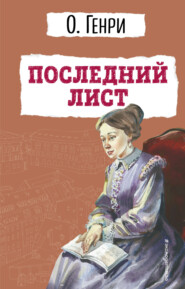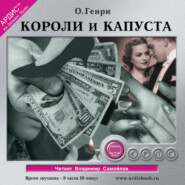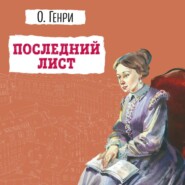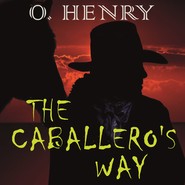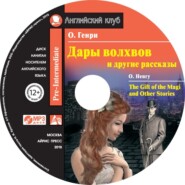По всем вопросам обращайтесь на: info@litportal.ru
(©) 2003-2024.
✖
Roads of Destiny
Настройки чтения
Размер шрифта
Высота строк
Поля
"You will regret it, and despise me."
"I will live only to make you happy, and myself worthy of you."
Her fine small hand crept into his from beneath her cloak.
"I will trust you," she breathed, "with my life. And – and love – may not be so far off as you think. Tell him. Once away from the power of his eyes I may forget."
David went and stood before the marquis. The black figure stirred, and the mocking eyes glanced at the great hall clock.
"Two minutes to spare. A shepherd requires eight minutes to decide whether he will accept a bride of beauty and income! Speak up, shepherd, do you consent to become mademoiselle's husband?"
"Mademoiselle," said David, standing proudly, "has done me the honour to yield to my request that she become my wife."
"Well said!" said the marquis. "You have yet the making of a courtier in you, master shepherd. Mademoiselle could have drawn a worse prize, after all. And now to be done with the affair as quick as the Church and the devil will allow!"
He struck the table soundly with his sword hilt. The landlord came, knee-shaking, bringing more candles in the hope of anticipating the great lord's whims. "Fetch a priest," said the marquis, "a priest; do you understand? In ten minutes have a priest here, or – "
The landlord dropped his candles and flew.
The priest came, heavy-eyed and ruffled. He made David Mignot and Lucie de Verennes man and wife, pocketed a gold piece that the marquis tossed him, and shuffled out again into the night.
"Wine," ordered the marquis, spreading his ominous fingers at the host.
"Fill glasses," he said, when it was brought. He stood up at the head of the table in the candlelight, a black mountain of venom and conceit, with something like the memory of an old love turned to poison in his eyes, as it fell upon his niece.
"Monsieur Mignot," he said, raising his wineglass, "drink after I say this to you: You have taken to be your wife one who will make your life a foul and wretched thing. The blood in her is an inheritance running black lies and red ruin. She will bring you shame and anxiety. The devil that descended to her is there in her eyes and skin and mouth that stoop even to beguile a peasant. There is your promise, monsieur poet, for a happy life. Drink your wine. At last, mademoiselle, I am rid of you."
The marquis drank. A little grievous cry, as if from a sudden wound, came from the girl's lips. David, with his glass in his hand, stepped forward three paces and faced the marquis. There was little of a shepherd in his bearing.
"Just now," he said, calmly, "you did me the honor to call me 'monsieur.' May I hope, therefore that my marriage to mademoiselle has placed me somewhat nearer to you in – let us say, reflected rank – has given me the right to stand more as an equal to monseigneur in a certain little piece of business I have in my mind?"
"You may hope, shepherd," sneered the marquis.
"Then," said David, dashing his glass of wine into the contemptuous eyes that mocked him, "perhaps you will condescend to fight me."
The fury of the great lord outbroke in one sudden curse like a blast from a horn. He tore his sword from its black sheath; he called to the hovering landlord: "A sword there, for this lout!" He turned to the lady, with a laugh that chilled her heart, and said: "You put much labour upon me, madame. It seems I must find you a husband and make you a widow in the same night."
"I know not sword-play," said David. He flushed to make the confession before his lady.
"'I know not sword-play,'" mimicked the marquis. "Shall we fight like peasants with oaken cudgels? Hola! François, my pistols!"
A postilion brought two shining great pistols ornamented with carven silver, from the carriage holsters. The marquis tossed one upon the table near David's hand. "To the other end of the table," he cried; "even a shepherd may pull a trigger. Few of them attain the honour to die by the weapon of a De Beaupertuys."
The shepherd and the marquis faced each other from the ends of the long table. The landlord, in an ague of terror, clutched the air and stammered: "M-M-Monseigneur, for the love of Christ! not in my house! – do not spill blood – it will ruin my custom – " The look of the marquis, threatening him, paralyzed his tongue.
"Coward," cried the lord of Beaupertuys, "cease chattering your teeth long enough to give the word for us, if you can."
Mine host's knees smote the floor. He was without a vocabulary. Even sounds were beyond him. Still, by gestures he seemed to beseech peace in the name of his house and custom.
"I will give the word," said the lady, in a clear voice. She went up to David and kissed him sweetly. Her eyes were sparkling bright, and colour had come to her cheek. She stood against the wall, and the two men levelled their pistols for her count.
"Un—deux—trois!"
The two reports came so nearly together that the candles flickered but once. The marquis stood, smiling, the fingers of his left hand resting, outspread, upon the end of the table. David remained erect, and turned his head very slowly, searching for his wife with his eyes. Then, as a garment falls from where it is hung, he sank, crumpled, upon the floor.
With a little cry of terror and despair, the widowed maid ran and stooped above him. She found his wound, and then looked up with her old look of pale melancholy. "Through his heart," she whispered. "Oh, his heart!"
"Come," boomed the great voice of the marquis, "out with you to the carriage! Daybreak shall not find you on my hands. Wed you shall be again, and to a living husband, this night. The next we come upon, my lady, highwayman or peasant. If the road yields no other, then the churl that opens my gates. Out with you into the carriage!"
The marquis, implacable and huge, the lady wrapped again in the mystery of her cloak, the postilion bearing the weapons – all moved out to the waiting carriage. The sound of its ponderous wheels rolling away echoed through the slumbering village. In the hall of the Silver Flagon the distracted landlord wrung his hands above the slain poet's body, while the flames of the four and twenty candles danced and flickered on the table.
THE RIGHT BRANCH
Three leagues, then, the road ran, and turned into a puzzle. It joined with another and a larger road at right angles. David stood, uncertain, for a while, and then took the road to the right.
Whither it led he knew not, but he was resolved to leave Vernoy far behind that night. He travelled a league and then passed a large château which showed testimony of recent entertainment. Lights shone from every window; from the great stone gateway ran a tracery of wheel tracks drawn in the dust by the vehicles of the guests.
Three leagues farther and David was weary. He rested and slept for a while on a bed of pine boughs at the roadside. Then up and on again along the unknown way.
Thus for five days he travelled the great road, sleeping upon Nature's balsamic beds or in peasants' ricks, eating of their black, hospitable bread, drinking from streams or the willing cup of the goatherd.
At length he crossed a great bridge and set his foot within the smiling city that has crushed or crowned more poets than all the rest of the world. His breath came quickly as Paris sang to him in a little undertone her vital chant of greeting – the hum of voice and foot and wheel.
High up under the eaves of an old house in the Rue Conti, David paid for lodging, and set himself, in a wooden chair, to his poems. The street, once sheltering citizens of import and consequence, was now given over to those who ever follow in the wake of decline.
The houses were tall and still possessed of a ruined dignity, but many of them were empty save for dust and the spider. By night there was the clash of steel and the cries of brawlers straying restlessly from inn to inn. Where once gentility abode was now but a rancid and rude incontinence. But here David found housing commensurate to his scant purse. Daylight and candlelight found him at pen and paper.
One afternoon he was returning from a foraging trip to the lower world, with bread and curds and a bottle of thin wine. Halfway up his dark stairway he met – or rather came upon, for she rested on the stair – a young woman of a beauty that should balk even the justice of a poet's imagination. A loose, dark cloak, flung open, showed a rich gown beneath. Her eyes changed swiftly with every little shade of thought. Within one moment they would be round and artless like a child's, and long and cozening like a gypsy's. One hand raised her gown, undraping a little shoe, high-heeled, with its ribbons dangling, untied. So heavenly she was, so unfitted to stoop, so qualified to charm and command! Perhaps she had seen David coming, and had waited for his help there.
Ah, would monsieur pardon that she occupied the stairway, but the shoe! – the naughty shoe! Alas! it would not remain tied. Ah! if monsieur would be so gracious!
The poet's fingers trembled as he tied the contrary ribbons. Then he would have fled from the danger of her presence, but the eyes grew long and cozening, like a gypsy's, and held him. He leaned against the balustrade, clutching his bottle of sour wine.
"You have been so good," she said, smiling. "Does monsieur, perhaps, live in the house?"
"Yes, madame. I – I think so, madame."
"Perhaps in the third story, then?"
"No, madame; higher up."
The lady fluttered her fingers with the least possible gesture of impatience.
"Pardon. Certainly I am not discreet in asking. Monsieur will forgive me? It is surely not becoming that I should inquire where he lodges."
"Madame, do not say so. I live in the – "
"No, no, no; do not tell me. Now I see that I erred. But I cannot lose the interest I feel in this house and all that is in it. Once it was my home. Often I come here but to dream of those happy days again. Will you let that be my excuse?"








